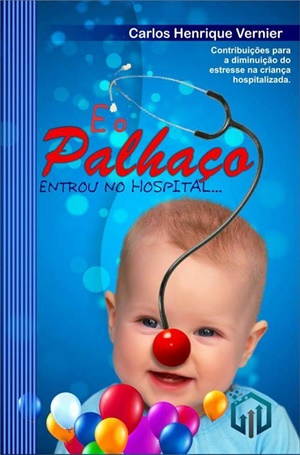Carlos Henrique Vernier (photo) was born in a Spiritist family in the city of Jaú, in the Brazilian state of São Paulo. He is a psychologist and works as a volunteer at the Francisco Xavier dos Santos Spiritist Centre. |
 |
He is the author of the book, E o palhaço entrou no hospital – contribuições para a diminuição do estresse na criança hospitalizada (And the clown went into the hospital – how to |
| help reduce stress levels of children in hospital). |
That is the main issue discussed in the following interview:
How did you become interested in Psychology?
I was always passionate about human beings and wanted to know its flaws and anxieties. I always wanted to help people overcome their personal conflicts. When I was a teenager I felt that I was the one who helped the most those around me – friends and family – with advice and guidance. But I thought I was going to read Law or Medicine. It was only in the year before applying for university that I decided to study Psychology.
I see patients in a private practice; I also give lectures about self-esteem and self-knowledge in state schools and work as a volunteer at the Elo Solidário NGO in the city of Bauru.
How did you link all that to the practice of being a “clown in hospital”?
I became interested in playing the role of a clown in hospitals when I was, I think, 16 and watched a film called “Patch Adams”. I had begun visiting child nurseries and elderly homes earlier, still as a teenager.
After watching the film, I decided to go deeper and found out more about the doctor whose life was described there. I bought Patch Adams’s books, I contacted him and eventually met him when he travelled to Brazil.
I was always passionate about magic and this is one art form that I practice when I dress up as a clown in hospitals. That is perhaps why I am known as “Magician Clown”.
I attended the first course to train as a hospital clown and after working many years as a volunteer in this area, I set up my own course based on what I had learned and what I had learned at university in the Psychology course.
Is the book you wrote based on those experiences?
Yes, the book takes a scientific approach on the contribution that play can have to reduce the stress levels of children in hospitals. In the book you can find information about how to become a hospital clown, what you can and cannot do during a visit, some tips that I learned from other clowns and from my own experiences and there are also recommendations of books and films.
How did you come up with the idea of publishing the book?
It came up when I was at university and was studying research methods. After working in this area for so many years, I decide to fulfil an old desire of sharing my experience and inspire other people to work as volunteers in hospitals and not only as clowns.
What are your best memories of that interaction with patients and families in hospitals?
I have many positive memories. I remember when I woman began staring me. When I asked her if something had happened she smiled and said: “I remember when my son had been in hospital for more than a year and you came to visit him”. I was surprised that she recognised me, as I had no make up on. I remember patients who held my hands to get an injection. Or when I heard from a mother: “Last week my daughter said she had a dream where you made magic for her, which shows how much it all meant to her”. We have lost many children, but I always remember them with lots of love and care, as they taught us so much! I always say that: Hospitals are true schools. Don’t ever miss the opportunity to learn. Learn with every person, with humbleness and love in your heart and don’t ever ever give yourself up.
How can we buy your book?
It will be on sale from July 12th from my practice in the city of Jaú in the following address: Rua Floriano Peixoto, 453 – Centro. Or through my professional page on Facebook by clicking here. For those who want to contact me for talks and lectures, you can contact me via mobile number + 55 14 998523798 or email vernierch@gmail.com.
Is there anything else you would like to say?
I hope that my book becomes a source of inspiration of all of those who want to dedicate themselves to the work of hospital clown or who intend to become doing voluntary work. Finally, I leave you with the words of Waldemar Seyssel, the true name of the famous Brazilian clown Arrelia: “To be a good clown you need to truly love children… and I LOVE THEM”. |